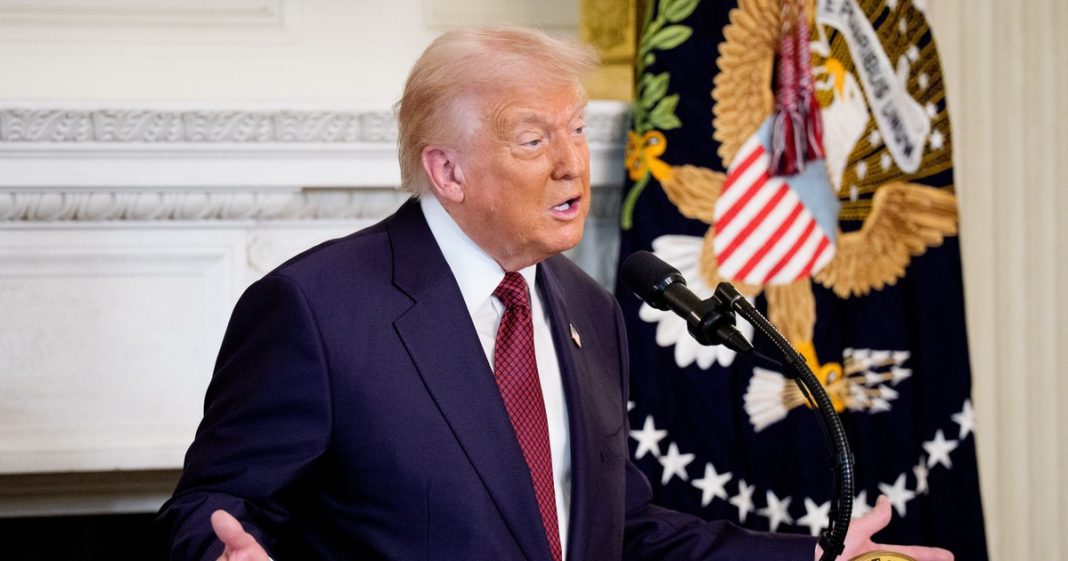Eswatini has confirmed receiving $5.1 million from the Trump administration in exchange for temporarily hosting deportees from the United States, making the kingdom one of the first African partners in Washington’s controversial third-country deportation programme.
Earlier this year, U.S. President Donald Trump, in a bid to enforce his strict immigration policies, sought to remove several migrants with questionable backgrounds from the United States, either to their countries of origin or to third countries – especially African nations willing to accept them.
Some countries, including Eswatini, Ghana, Rwanda, and Uganda, agreed to participate in the programme, while others, such as Nigeria, refused.
While initial statements framed these agreements as being undertaken on humanitarian grounds, recent information indicates that tangible exchanges took place: Eswatini recently received $5.1 million from the U.S., Equatorial Guinea was sent $7.5 million while Ghana secured visa relief for its citizens
The moves highlights how Washington’s controversial third-country deportation policy is delivering both financial and diplomatic returns for African partners.
Eswatini Minister confirms deal with Washington
According to Eswatini’s Finance Minister, Neal Rijkenberg, the funds were deposited into the National Disaster Management Agency (NDMA) account but remain unallocated and cannot yet be accessed.
The BBC reports that officials only learned the payment was linked to U.S. deportees after inquiries, with government spokesperson Thabile Mdluli stressing that Eswatini has “always been transparent” regarding U.S. financing, which covers welfare, temporary housing, and repatriation costs for the deportees.
So far, the kingdom has hosted two groups: five in July and ten in October, with one deportee repatriated to Jamaica and others awaiting return to their countries of origin.
U.S. Deportation Deals and African Benefits
While Eswatini received direct financial support, Ghana’s engagement with the U.S. programme has focused on visa restoration.
Under the Trump administration, the U.S. reversed earlier restrictions on Ghanaian visas, reinstating five-year, multiple-entry permits after previously limiting applicants to three-month, single-entry visas.
The BBC reports this development closely followed Ghana’s acceptance of 14 West African deportees, illustrating a diplomatic and policy payoff from cooperation with Washington.
Rwanda
Rwanda has also emerged as a significant participant in the programme, agreeing to host up to 250 deportees.
Government spokesperson Yolande Makolo confirmed the deal, noting that US and Rwandan officials signed the agreement in Kigali in June.
A Rwandan official, speaking to Reuters anonymously, added that under the arrangement, Rwanda will receive a US grant, with the grant letter signed in July, though officials have not disclosed the amount.
Rwandan officials will retain full discretion over who is accepted for resettlement, insisting that anyone with a criminal record, including those who have served prison time or face pending charges, will be excluded.
Equatorial Guinea
Equatorial Guinea is also among the African countries that have benefited financially from the US deportation scheme. Earlier this month, Washington transferred $7.5 million to Malabo to facilitate the acceptance of non-citizen deportees, according to a senior congressional Democrat, current and former State Department officials, and publicly available government data.
According to the UK Guardian, the funds sent to Equatorial Guinea mark the first time money allocated by Congress to address international refugee crises and sometimes support refugee resettlement in the United States has instead been repurposed by the Trump administration to accelerate deportations.
South Sudan
South Sudan, one of the world’s poorest nations, has also been listed as a destination for U.S. deportations, though the government in Juba has not disclosed what it expects in return for accepting migrants.
ABC reports that while no direct financial incentives were offered, South Sudanese officials anticipated other concessions, including possible sanctions relief for key ruling party figures and a chance to reset diplomatic ties with Washington.
Daniel Akech, a senior analyst for South Sudan at the International Crisis Group, told ABC that the country’s prolonged humanitarian and financial crisis leaves it highly vulnerable to external pressure.
Even so, he said Juba viewed the arrangement as a pragmatic, if reluctant, opportunity to ease sanctions and begin repairing its strained relationship with the United States.
These payments have sparked sharp criticism within the U.S. government, with senators questioning the decision to send funds to countries widely viewed as corrupt.
According to the New York Times, Democratic Senator Jeanne Shaheen of New Hampshire, the top Democrat on the Senate Foreign Relations Committee, criticized Secretary of State Marco Rubio for authorizing $7.5 million to the government of Equatorial Guinea to accept noncitizen deportees from the United States.
Shaheen said the “highly unusual payment to one of the most corrupt governments in the world raises serious concerns over the responsible and transparent use of American taxpayer dollars.”
The Trump administration has reportedly approached at least 58 countries to accept deportees from the United States.
“Whether it is tariff concessions or, in the case of African nations, the threat of travel bans or restrictions on diplomats, these are the leverage points being used to secure agreements,” Muzaffar Chishti, a senior fellow at the Migration Policy Institute, told Politico.
The strategy highlights how U.S. immigration policy has increasingly intertwined with broader diplomatic and economic negotiations, raising questions about the balance between enforcement and international relations.
For Eswatini, and the other African nations in this deal, the financial inflow places the nations at the center of debates over sovereignty, ethics, and the handling of deportees with no local ties, while Ghana’s visa gains demonstrate how African partners are leveraging Washington’s deportation strategy for diplomatic and practical benefits.
